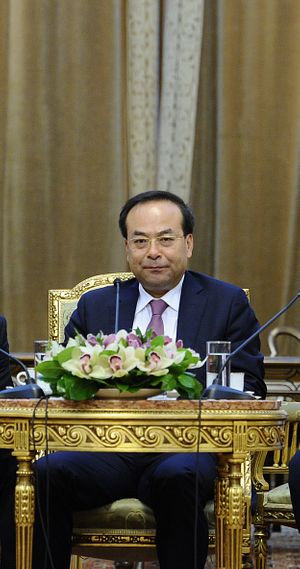The Politburo of the Chinese Communist Party (CCP) decided to expel Sun Zhengcai, the former top leader of Chongqing City, from the party and dismiss him from public office for “serious violations of discipline.” The decision was published on September 29, two days before China’s October 1 National Day.
Sun, 54, was once a member of the 25-person body himself and a rising political star in China. Before Sun’s abrupt removal from his Chongqing post, it was widely believed by many observers of Chinese politics that he would be promoted to the country’s top leadership body — the CCP’s 7-member Politburo Standing Committee (PSC) — during the upcoming 19th Party Congress.
Xinhua said the Politburo, in a meeting, reviewed an investigation report conducted by the Central Commission for Discipline Inspection (CCDI) and permitted the CCDI to transfer Sun’s case to the judiciary, which means Sun will face criminal prosecution. Sun was removed from his post in Chongqing on July 14.
The downfall of Sun had been indicated earlier in July, when Xinhua announced that he was under investigation, as The Diplomat noted. The most recent statement provides more detail than the July reporting.
The core accusation is that “Sun’s faith and belief [in communism] was shaken” and he “seriously violated the party discipline and rules.” Xinhua initially said in its statement that Sun “had no faith or belief” and “seriously trampled on the party discipline and rules,” and then minutes later, the wording was delicately changed to the present version, which sounds less harsh. This may be a signal that there is still controversy about Sun within the party.
Besides the ideological accusation, Sun also reportedly violated other CCP disciplines, including “seeking ostentation and privileges” for himself, engaging in nepotism, abusing power and influence, and being “bureaucratic, lazy and inactive at work.”
While the above allegation may still look trivial, subsequent accusations will likely lead to at least a life sentence for Sun, based on previous cases involving CCP senior officials, such as Bo Xilai and Ling Jihua.
Perhaps most seriously, Sun was accused of leaking confidential party information, seeking benefits for others and accepting a “huge amount” of money and expensive gifts in return, and trading power for sex.
The statement concluded Sun’s problems in a tremendously harsh tone:
Sun Zhengcai totally deviated from the Party spirit and political requirements on senior officials, betrayed the trust of the central committee and the people, and inflicted huge harm to the party and the country with an extremely bad social influence.
In fact, the tone and wording of the above accusations are more harsh than that used for Bo and other recently falling officials.
Sun’s downfall was clear three months ago when the investigation was announced. What is particularly noteworthy of the latest announcement is the timing: the Politburo rushed to release the decision two days before marking National Day and three weeks before the party congress.
On the one hand, the Chinese public is currently enjoying an eight-day holiday. The holiday may significantly decrease public attention on the Sun announcement. On the other hand, the party leadership, led by Xi Jinping, may be aiming to send a message ahead of the party congress. As Willy Lam, politics professor at the Chinese University of Hong Kong, told The Guardian: “This is a warning that Xi sends to his enemies, that if you do not profess allegiance to me, you may suffer the same fate as Sun Zhengcai.”
In fact, after the announcement was released, almost all of China’s provinces held emergency meetings specially on Sun’s case and senior provincial officials vowed to “firmly support the central committee’s decision.” The display of loyalty was not only performed in the provincial level government, but in nearly all the ministries, state-run enterprises and government-related institutions.
Global Times, a Chinese state-run newspaper, wrote of the decision:
An official must be politically loyal and strictly observe Party discipline and State law. He or she must serve the people wholeheartedly and maintain rightful conduct and good morals. Otherwise, despite being young and promising, he or she may come to a tragic end. This is one of the lessons people can draw from Sun’s fall… Those who consider themselves privileged are destined to pay a heavy price.
































